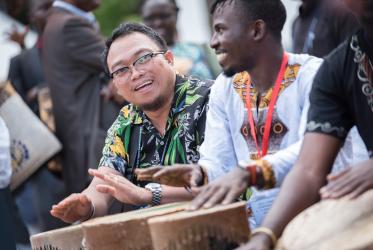Ideas for "bringing unity down to earth", "communicative action" and a "theology of the wilderness" were among the winning entries submitted for an essay contest on Prospects for Ecumenism in the 21st Century. The winners, two women and four men, come from Africa, Asia, Europe and North America.
The essay contest is part of the programme to commemorate the World Council of Churches' (WCC) 60th anniversary. More than 50 young theologians from 36 churches in 24 countries submitted papers.
Participants in the essay contest gave "hope, inspiration and leadership" to the ecumenical movement, WCC general secretary Rev. Dr Samuel Kobia wrote in a letter announcing the six winners. "This is the best birthday gift the WCC could receive".
The winners, whose essays where selected by an international team of WCC executives and Bossey Ecumenical Institute professors, are (in alphabetical order, additional information below):
-
Ms Erin Brigham, Roman Catholic Church, USA
-
Mr Beril Huliselan, Indonesian Christian Church (GKI), Indonesia
-
Mr Gu Mengfei, China Christian Council, China
-
Mr Peniel Jesudason Rufus Rajkumar, Church of England, United Kingdom/India
-
Rev. Chad Rimmer, Evangelical Lutheran Church in America, USA/Denmark
-
Ms Lucy Wambui Waweru, Presbyterian Church of East Africa, Kenya/Netherlands
The selected essayists will have the opportunity to discuss their ideas at an international consultation on Ecumenism in the 21st Century, to take place in January 2009 in Belem, Brazil. Theirs and other selected essays will be printed by WCC Publications and published on the WCC website.
"After reading your papers, we are more confident that the one ecumenical movement is the work of the Holy Spirit - created and sustained to make our unity in Christ visible and our witness to the world credible," Kobia wrote to the participants.
Additional information on the winners:
Erin Brigham, a member of the Roman Catholic Church in the United States of America, is a doctoral student in systematic and philosophical theology at the Graduate Theological Union of Berkeley in California. The focus of her work is on ecumenical dialogue and ecclesiology, with an emphasis on the Roman Catholic Church.
Brigham's essay on Communicative Action as an Approach to Ecumenical Dialogue discusses how visible unity has been understood in the past century, and the current ambiguity on the nature of the unity we seek. She proposes a way to recognize unity within the process of dialogue itself.
Beril Huliselan, from the Indonesian Christian Church (GKI), is a graduate of the Jakarta Theological Seminary. He currently staffs the Theological Research Commission of the Indonesian Christian Church.
His essay Bringing Unity Down to Earth asserts that ecumenism should be understood as the "moment of God's incarnation in Christ". The author argues that what has become a "unity movement" seeking to fix norms and forms must be converted to "unity in movement". Christ must be the central figure of the ecumenical movement. It must be active, bringing fullness of life to all. The first step for actualization is pre-theological, he writes, it is a matter of ongoing faith. The second step relates to reflection about God from the context of humanity - the hermeneutic of incarnation.
Gu Mengfei, is a staff member with the research department of the China Christian Council. He is a graduate of Nanjing and Beijing universities. His published work concerns the history of the church in China.
Mengfei's essay The Post-Denominational Era - Chinese churches on the way toward unity describes how the churches in China are striving to overcome Christian denominationalism inherited from Western missionaries. It highlights important steps, such as the move towards united worship in 1958, and the principles of seeking common ground while retaining difference with mutual respect.
Peniel Jesudason Rufus Rajkumar, a member of the Church of England, is a lecturer at the United Theological College in Bangalore, India. He completed his doctoral thesis in Applied Theology and Ethics at the University of Kent in Canterbury, England. He has authored Challenges of Transition: Religion and Ethics in Changing Contexts (2007) and is currently working on a book on Dalit theology.
His essay, Towards a Transforming Togetherness, is a contextually-grounded treatment of the topic: the future of ecumenism in the twenty-first century. Understandings of "togetherness" through trinitarian unity and "difference" within postmodernity highlight the dialectical tension between promise and challenge within the ecumenical movement.
Rev. Chad Rimmer, an ordained minister in the Evangelical Lutheran Church in America, is pastor of the International Church of Copenhagen.
His essay Towards an Ecumenical Theology of the Wilderness attempts to place ecumenism in the context of a post-modern world in which attention to function takes precedence over concern for form. Therefore it suggests to articulate the evolving functions of the ecumenical movement, rather than reconfiguring its forms. The "theology of wilderness" he proposes, applied to the current ecumenical scene, involves a return to observing the giftedness of each ecumenical partner; an embodiment of the Sabbath as a gift and church unity as a gift in Christ; as well as the expectation that the ecumenical movement will be transformed by the journey.
Lucy Wambui Waweru, from the Presbyterian Church of East Africa in Kenya, is a graduate of St Paul's University in Limuru and is currently pursuing a master's degree in New Testament with the Protestant Theological University in Kampen, Netherlands. She hopes to serve her church as an ordained minister.
Waweru's essay Preparing for Tomorrow celebrates many of the achievements of the past 60 years from the biblical perspective of the Israelites coming into the land of Canaan under Joshua's command. The author articulates a vision for ecumenism that addresses the challenges posed by globalization, taking note of the shifting paradigms, the need to empower people at the grassroots, especially youth and women, and the need to encourage the gift of service.








